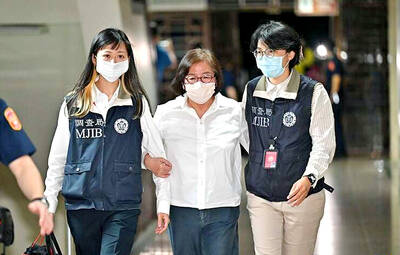Accompanied by members of the Youth Labor Union 95, a former part-time employee of the Control Yuan, who asked to be identified only by the surname Chen, yesterday accused his former employer of violating the Labor Standards Act (勞動基準法).
“I started working for the Control Yuan in May last year, but realized only in March that the Control Yuan did not list my name under the labor insurance coverage until October,” Chen told reporters at the group’s headquarters in Taipei.
Employers are required by law to register employees for labor insurance and pay part of their fees.
“I told my superior that they may have violated the Labor Standards Act on April 1, but they said that they didn’t know about the regulations and would check and get back to me,” Chen said. “So far, I haven’t heard anything.”
Besides the labor insurance issue, Chen said that the Control Yuan had never paid him for overtime or for working on public holidays.
Youth Labor Union 95 executive member Liu Yu-hsueh (劉侑學) said that the Control Yuan owed Chen for unpaid overtime and for working on holidays.
Chen also said that the Control Yuan had asked all its part-time employees to sign a set of regulations with clauses that violated the Labor Standards Act.
“My supervisor, a senior Control Yuan secretary named Wang Hsin-hsien [王新憲], handed the regulations to us, asked us to sign on the spot, and called our names one by one to turn in the signed paper,” Chen said.
“When I refused to sign it right away and told him I needed some time to go over it and think about it, he said that those who didn’t want to sign didn’t need to come to work the next day,” he said.
A copy of the regulations that Chen showed at the press conference said the Control Yuan could “terminate employment at any time if [the part-time employee] does not follow the rules, performs poorly or shows a bad attitude toward assignments given by a Control Yuan employee.”
The regulation also required part-time employees to give two weeks’ notice before resigning.
“This is obviously illegal,” Liu said. “The Labor Standards Act specifically lists conditions in which an employee can be fired, and none of the situations in the [Control Yuan] regulations meet the conditions in the law.”
Liu said the act only requires an employee to tender his or her resignation 10 days in advance.
Wang rebutted all the accusations when contacted by the Taipei Times.
“We give [part-time employees] more severe regulations because we want them to follow the rules, but if they don’t, we won’t handle it according to our own regulations. We’ll still follow the law,” Wang said.
He denied having told Chen not to come to work the next day if he didn’t sign the regulations.
“As for the labor insurance issue, I think there’s a misunderstanding, but I’m not too sure exactly what happened,” Wang said, adding that he would investigate the matter to find out what went wrong.
Liu said that they had reported the case to Taipei City’s Department of Labor.
“They will send people to the Control Yuan to investigate by Monday at the latest,” he said.

Costa Rica sent a group of intelligence officials to Taiwan for a short-term training program, the first time the Central American country has done so since the countries ended official diplomatic relations in 2007, a Costa Rican media outlet reported last week. Five officials from the Costa Rican Directorate of Intelligence and Security last month spent 23 days in Taipei undergoing a series of training sessions focused on national security, La Nacion reported on Friday, quoting unnamed sources. The Costa Rican government has not confirmed the report. The Chinese embassy in Costa Rica protested the news, saying in a statement issued the same

Taiwan is to extend its visa-waiver program for Philippine passport holders for another year, starting on Aug. 1, Minister of Foreign Affairs Lin Chia-lung (林佳龍) said on Friday. Lin made the announcement during a reception in Taipei marking the 127th anniversary of Philippine independence and the 50th anniversary of the establishment of the Manila Economic and Cultural Office (MECO) in Taiwan, the Ministry of Foreign Affairs said. The decision reflected Taiwan’s commitment to deepening exchanges with the Philippines, the statement cited Lin as saying, adding that it was a key partner under the New Southbound Policy launched in 2016. Lin also expressed hope

Temperatures in New Taipei City’s Sindian District (新店) climbed past 37°C yesterday, as the Central Weather Administration (CWA) issued heat alerts for 16 municipalities, warning the public of intense heat expected across Taiwan. The hottest location in Taiwan was in Sindian, where the mercury reached 37.5°C at about 2pm, according to CWA data. Taipei’s Shilin District (士林) recorded a temperature of 37.4°C at noon, Taitung County’s Jinfeng Township (金峰) at 12:50 pm logged a temperature of 37.4°C and Miaoli County’s Toufen Township (頭份) reached 36.7°C at 11:40am, the CWA said. The weather agency yesterday issued a yellow level information notice for Taipei, New

CASE: Prosecutors have requested heavy sentences, citing a lack of remorse and the defendants’ role in ‘undermining the country’s democratic foundations’ Five people affiliated with the Chinese Nationalist Party (KMT), including senior staff from the party’s Taipei branch, were indicted yesterday for allegedly forging thousands of signatures to recall two Democratic Progressive Party (DPP) lawmakers. Those indicted include KMT Taipei chapter director Huang Lu Chin-ru (黃呂錦茹), secretary-general Chu Wen-ching (初文卿) and secretary Yao Fu-wen (姚富文), the Taipei District Prosecutors’ Office said in a news release. Prosecutors said the three were responsible for fabricating 5,211 signature forms — 2,537 related to the recall of DPP Legislator Wu Pei-yi (吳沛憶) and 2,674 for DPP Legislator Rosalia Wu (吳思瑤) — with forged entries accounting for